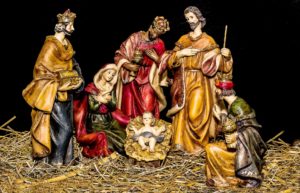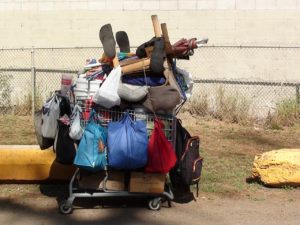The Nativity story is challenging to wrestle with at times. Often we describe a peaceful birth scene, in a manger, in the little town of Bethlehem. The  promised savior is born and greeted by an awesome host of angels, shepherds and wise men. Yet, this story neglects some of the historical realities of Jesus’s birth. His parents, Joseph and Mary, weren’t visiting Bethlehem for fun; instead by decree of the Roman occupying force they were forced to return to Bethlehem to be counted in a census. A near-term Mary probably wasn’t enthusiastic about her multi-day journey. And while the biblical narrative suggests that Joseph and Mary could have afforded to have stayed at the inn there was no room and they were compelled to rest in a humble stable. Jesus enters the world not with plush amenities, but to a stable, away from his parents’ home. Shortly after his birth, he and his parents are forced to flee to evade his killing. The Nativity tells the story of a Jesus, who comes to us marginalized by circumstances and under the domination of an occupying power.
promised savior is born and greeted by an awesome host of angels, shepherds and wise men. Yet, this story neglects some of the historical realities of Jesus’s birth. His parents, Joseph and Mary, weren’t visiting Bethlehem for fun; instead by decree of the Roman occupying force they were forced to return to Bethlehem to be counted in a census. A near-term Mary probably wasn’t enthusiastic about her multi-day journey. And while the biblical narrative suggests that Joseph and Mary could have afforded to have stayed at the inn there was no room and they were compelled to rest in a humble stable. Jesus enters the world not with plush amenities, but to a stable, away from his parents’ home. Shortly after his birth, he and his parents are forced to flee to evade his killing. The Nativity tells the story of a Jesus, who comes to us marginalized by circumstances and under the domination of an occupying power.
Our church has affirmed that working for justice with people on the margins is doing God’s will. As a Christian, I view this as a moral issue—one that often hits the most vulnerable hardest. People with and without housing alike are a part of our church. We know that congregations and shelter ministries perform amazing work in direct service and support in our calling to love our neighbor. Using our voices for advocacy and calling for public change is another way to serve that calling.
Housing and homelessness didn’t garner a lot of attention during the last presidential campaign. After such a rancorous and polarizing election, many of the issues brought to the fore of the debates now seem to be charged by partisan grudges and political gridlock. Over the next several years, homelessness and unaffordable housing will inevitably draw our attention because housing costs continue to rise sharply and many of us will be forced to struggle even more to keep a roof over our heads.
There is a good chance that you’ve noticed the rising costs of housing already. If you’re feeling really burdened by a sharp mortgage or rent increase, you’re not alone. The stability of our housing infrastructure is starting to fall apart around us. While the U.S. economy is still growing, spiking housing costs and leveled wages across the country are increasing instability for many hard-working families. This should concern us.
 Affordable housing programs are often the best tools local governments can use to help people get off the street and back into a supportive community. They work remarkably well, and offer people with limited opportunity a chance to rise out of poverty. But housing programs are often the very last to see any increases in federal investment; because of this, the cycle of poverty continues.
Affordable housing programs are often the best tools local governments can use to help people get off the street and back into a supportive community. They work remarkably well, and offer people with limited opportunity a chance to rise out of poverty. But housing programs are often the very last to see any increases in federal investment; because of this, the cycle of poverty continues.
The support of shelter ministries by congregations is becoming even more essential for those struggling in the community. People of faith can also be instrumental in bringing leaders together. The people in our pews are Republicans, Democrats, and Independents. In a time when polarization raises barriers and reduces bipartisan communication, religious communities are uniquely equipped to be a bridge between two sides. Lawmakers care deeply about the work and needs of centers of worship in their districts, and must hear from their constituents that poverty is a critical issue.
So what should we do right NOW? We can begin by committing to public engagement and bringing more people into public life in the new year. It is never too soon to get involved. Here’s how:
- Write emails to your lawmakers and urge them to get ready for work on housing. There are several was the new White House Administration and Congress could make a difference by addressing housing issues in 2017—This can start by passing a national budget that supports the most vulnerable.
- Find friends in your congregation and encourage them to connect with their lawmakers. The more people who express to their lawmakers the importance of working to improve homelessness the more likely the impact.
- Stay up-to-date on housing and poverty issues as they come through Congress by joining the ELCA Advocacy Network.
At the start of the Christmas story, Jesus began his life without a place to call home. He was not only our Savior, but also a teacher and an advocate. Jesus comes this Christmas not just for the healthy, but for the sick and those who need his embrace most. As we renew ourselves this Advent in the message about the amazing power of God’s redeeming love, I hope together we can rediscover that strong Biblical tradition and reflect on what we are freed through Christ to do in the coming year. If you are interested in engaging further on this issue and connect with other advocates, contact us on social media, or at washingtonoffice@elca.org. In the meantime, I wish you a very blessed Christmas, and start of the new year.
